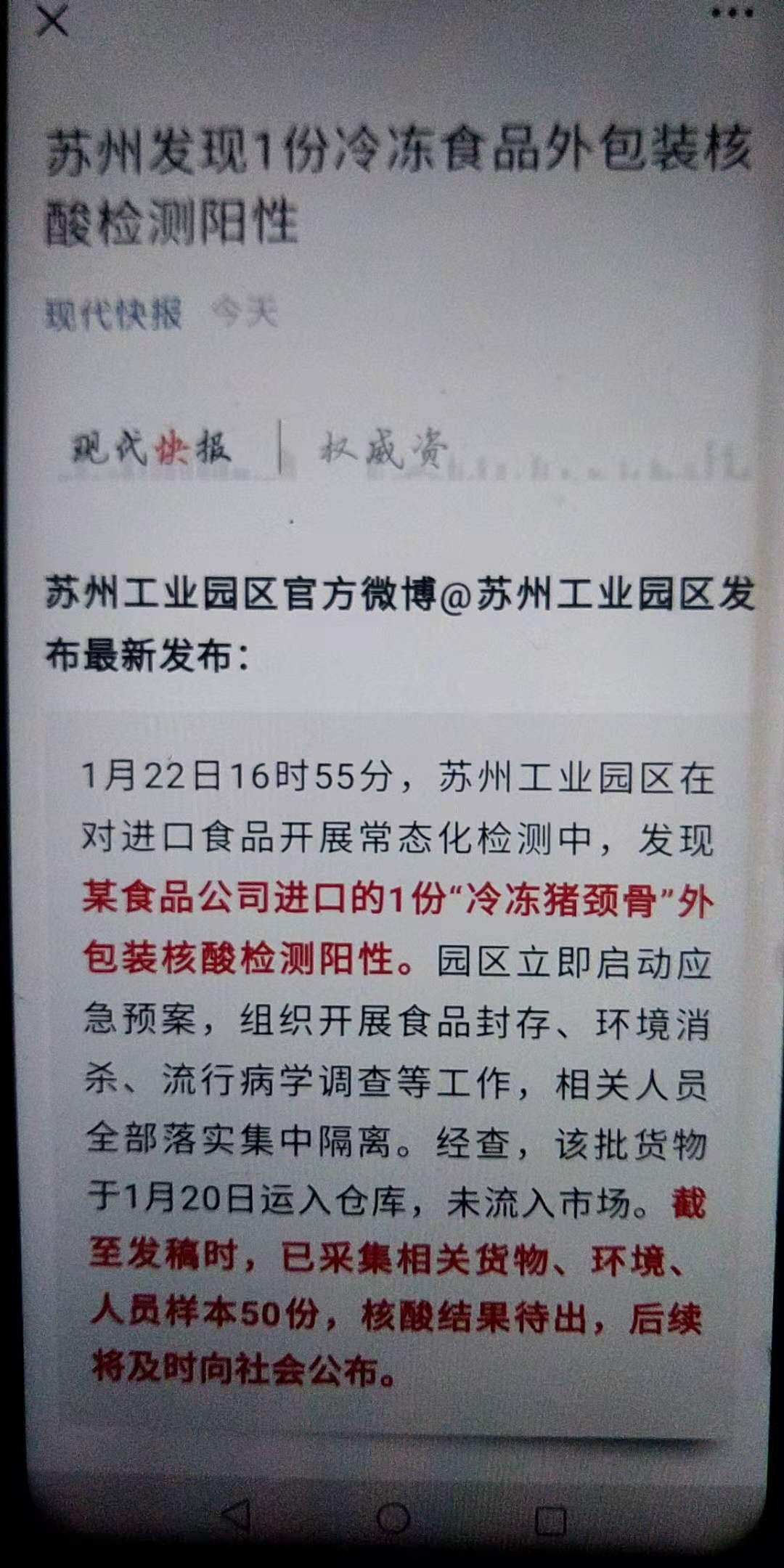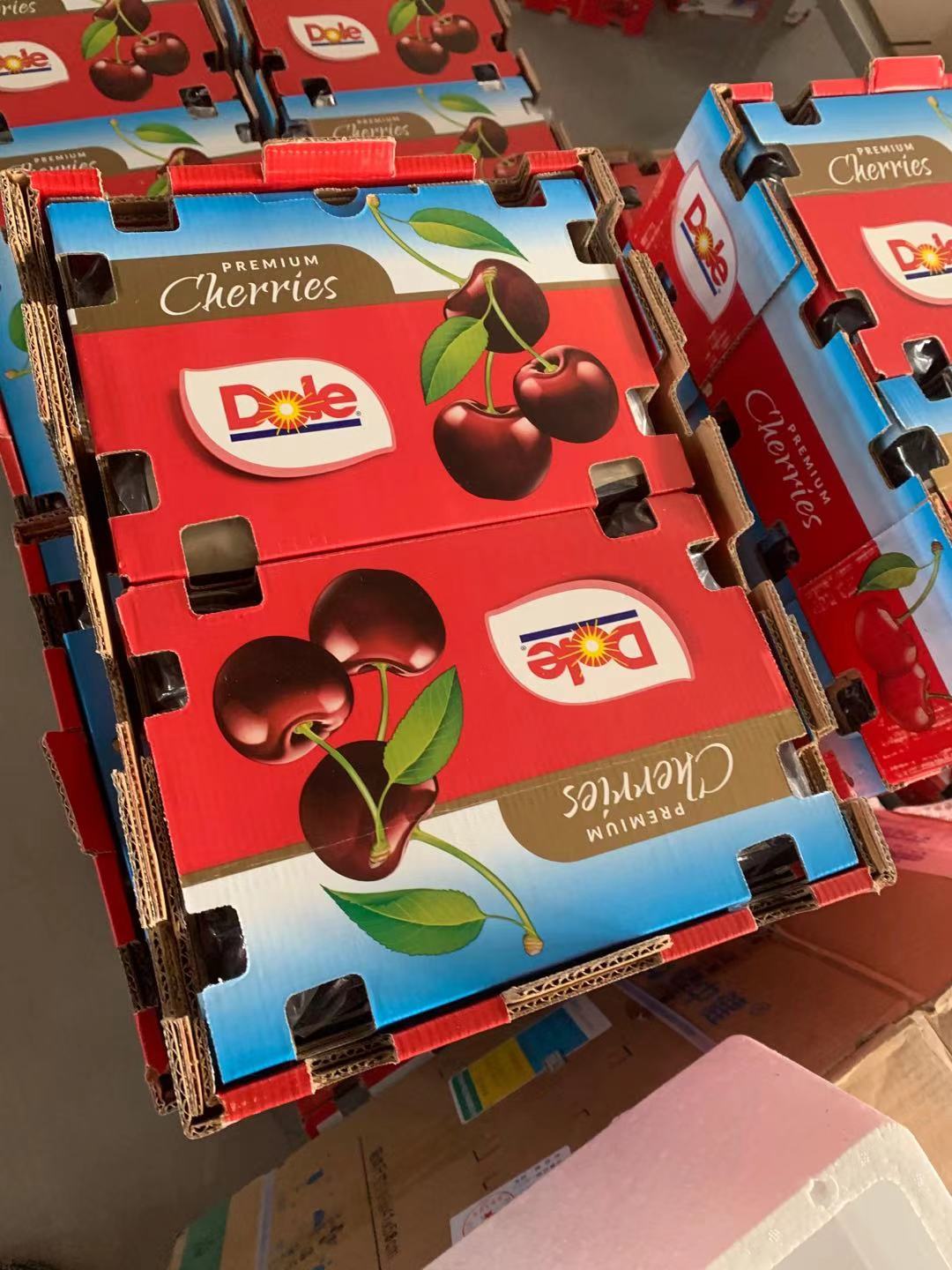Many places have found that imported foods have tested positive. What is the problem?
2021-01-23 18:29:28 Source: Science and Technology Daily Author: too Guozhong
Science and Technology Daily reporter Guo Guozhong Correspondent Zhang Xuehua Zhang Yun Jiang Wenrong

According to Wuxi Liangxi's release: On January 21, the Liangxi District Center for Disease Control and Prevention of Wuxi City, during the normalized monitoring of imported food, found a copy of imported cherries (production date: 2020.12.18) that tested positive for nucleic acid on the inner surface .
According to the "Modern Express" news: At 16:55 on January 22, during the normalization of imported food in Suzhou Industrial Park, it was discovered that a "frozen pig neck bone" package imported by a food company had a positive nucleic acid test.

Since the beginning of this year, positive nucleic acid tests of imported food have been found in many places in China, which has brought great pressure and test to epidemic prevention and control, and has also attracted great attention from consumers.
So why has imported food become a high risk point for the epidemic? Where does the new coronavirus on the surface of food or its packaging come from? What are the requirements for imported food safety testing in my country? How to further strengthen control measures in the next step? How to avoid contact and infection in consumer shopping? On January 23, Science and Technology Daily interviewed relevant experts.
There are many factors that cause food to be contaminated by the new coronavirus

"Imported food has become an important food source for Chinese consumers. At present, my country is the world's largest import market for food and agricultural products." According to Dr. Li Yingchao, the leader of the safety food discipline of the Inspection and Testing College of Changzhou Engineering Vocational and Technical College, according to customs data, 2019 my country imported 4.841 million tons of various types of meat and 6.265 million tons of aquatic products. This year, affected by the epidemic, in order to ensure market supply and stabilize prices, my country's imported meat has maintained rapid growth.
"Food, especially meat, aquatic products and other fresh and frozen products are produced, processed, packaged, stored, transported, and sold. If the surrounding environment is contaminated by the new coronavirus, or the employees themselves are infected with the new coronavirus, All are likely to be contaminated.” said Professor Yang Zhenquan of Yangzhou University, an expert on food safety in catering services of the State Food and Drug Administration.
According to Yang Zhenquan, generally speaking, the lower the temperature, the longer the virus will survive. The low temperature environment created by the cold chain provides a good space for the virus to survive. The new crown pneumonia virus has the characteristics of low temperature resistance. The surface of frozen food and the cold storage environment are low, which are suitable for long-term survival of the virus. If the virus is transported through the cold chain after being contaminated in the high-incidence area of the new crown epidemic or in various circulation links, it is very easy to bring the virus to Non-epidemic areas and cause the spread of the epidemic.
"If there is a new coronavirus in the food processing, transportation, circulation, and sales environment (air, personnel, production equipment, etc.), the food may carry the new coronavirus due to cross-contamination or secondary pollution." Yang Zhenquan said, for example, in processing or People in the transportation and distribution links are infected with the new coronavirus, and the virus may sink on the surface of food through contact with equipment, or even through droplets and aerosols during breathing.
In the opinion of experts, the imported cold-chain foods that enter the customs every day are huge, with many types and batches. Due to many factors, all inspections are not easy. Viruses are pervasive. The outer packaging, inner packaging, and food itself have hidden risks in each link. It is impossible to find all viruses through random inspections. Therefore, we must attach great importance to the potential safety risks of imported food and its cold chain logistics links.
A positive sample does not necessarily have transmission activity
"Currently, the positive samples of the new coronavirus on the surface of the food or food packaging found by the test are all imported foods, especially cold chain foods. This is closely related to the current severity of the new crown epidemic abroad and the characteristics of the new crown virus that can survive longer in low temperature conditions." Li Yingchao said.
"However, it needs to be emphasized that a sample with a positive test result through the most widely used PCR nucleic acid detection technology does not necessarily mean that it has transmission activity." Li Yingchao said that the presence of nucleic acid fragments can only indicate that the sample is contaminated with the new coronavirus. Whether the virus has biological activity, that is, its transmission, requires further confirmation of microbial culture technology. Previously, Chen Junshi, an academician of the Chinese Academy of Engineering and a researcher at the National Center for Food Safety Risk Assessment, once stated that no live virus has been isolated and cultured from positive samples on food surfaces.
Yang Zhenquan told reporters that existing research and prevention and control practices show that new coronary pneumonia is not a food-borne disease, and no infection caused by food intake has been found. At present, all localities have increased control measures such as investigation, disinfection, testing, and screening. "The problematic goods exposed are small in terms of the overall proportion of goods, and the viral nucleic acid load is also low. As long as strict testing, disinfection and other protective measures are taken, there is no need to stay away from cold chain food. Moreover, the detection results It does not mean that it must be contagious." Yang Zhenquan said.
Yang Zhenquan believes that nucleic acid positivity and virus survival are not the same concept. The premise of material transmission is that the virus is contagious. The virus is composed of a protein shell and a long nucleic acid chain. If the shell is destroyed, the virus loses its infectivity, but the nucleic acid test can still be positive.
In Li Yingchao's view, although imported frozen foods have been tested for the new coronavirus from time to time, from the actual situation, the probability of the new coronavirus nucleic acid positive for frozen food is extremely low. At present, the complete suspension of imported food has a tendency to waste food due to choking. Strengthening the supervision of imported food is the foundation. This is also a major challenge and opportunity for my country's food safety supervision system.
my country has established a supervision and prevention system for imported cold chain food
Li Yingchao introduced that on November 9, 2020, the Office of the State Council’s Joint Prevention and Control Mechanism for the New Coronavirus Pneumonia Epidemic issued the “Work Plan for Preventive and Comprehensive Disinfection of Imported Cold Chain Food” to the country. The plan requires that the entire process of closed-loop control and traceability is realized, and the risk of the new crown virus being imported through imported cold chain food is minimized.
"The "Work Plan for Preventive and Comprehensive Disinfection of Imported Cold-chain Food" specifically makes careful arrangements for the preventive and comprehensive disinfection of imported cold-chain food, and puts forward specific requirements for the traceability of the entire process of closed-loop control of imported cold-chain food." Yang Zhenquan said, According to the plan, after the relevant departments have completed the detection and sampling of the new coronavirus, they must follow the division of responsibilities and strictly implement preventive and comprehensive disinfection treatment before the imported cold chain food comes into contact with people in China for the first time. The possible transmission chain of the virus keeps the risk to a minimum.
Li Yingchao told reporters that in early December 2020, the national imported cold chain food traceability management platform was completed and put into operation, basically realizing the information traceability of the entire chain from customs entry to production and processing, wholesale and retail, and catering services, online investigation, and precise control , On-site disposal and other aspects played an important role. Subsequently, various provinces and cities have also issued relevant management regulations to strengthen the supervision of imported foods, especially cold chain foods, and continue to pay attention to high-risk products from key countries and regions.
It is worth mentioning that in response to the recent problems of imported food, the General Administration of Customs has strengthened source control, adopted measures such as moving the border forward, carrying out remote video inspections, and suspending product imports, further strict port inspection and quarantine, and comprehensive risk monitoring. . For relevant enterprises that found problems, according to the risk level, they took measures to suspend their registration in China, suspend the import of related products, and implement the return and destruction of temporarily detained goods, and resolutely refused to bring "poisons" into the customs.
Take multiple measures to reduce the risk of infection
The reporter learned that the new crown pneumonia prevention and control plan requires local areas to implement daily protection, health monitoring, and active nucleic acid screening for employees related to cold chain food in order to improve the sanitary conditions of the production, processing and trading environment and reduce the risk of infection for employees. In addition, according to the "Notice of the Ministry of Transport on Further Strengthening the Prevention and Control of the New Coronary Pneumonia Epidemic in Cold Chain Logistics Channels" (Jiaoyun Mingdian [2020] No. 241), it is aimed at highway and waterway import cold chain food logistics enterprises and key logistics links , Formulated technical guidelines for the prevention, control and disinfection of new coronaviruses in imported cold chain food logistics by roads and waterways.
"The Chinese Center for Disease Control and Prevention requires that industry practitioners who are in close contact with cold chain products with a high possibility of new crown virus contamination, such as the handling, processing, and sales of cold chain products, need to increase their awareness of protection and do daily protections. , To avoid direct skin contact with cold chain products that may be contaminated; hands should be washed and disinfected immediately after the work is completed, and nucleic acid screening should be performed regularly." Yang Zhenquan said.
Experts pointed out that the current new crown pneumonia epidemic is still spreading globally. During the epidemic, it is necessary to strengthen the sanitation and disinfection and closed management of all links in the food industry chain. Import and export enterprises are required to improve production, processing and trading conditions and normalize the prevention and control of the epidemic. The measures are implemented in detail. Secondly, the quarantine supervision part should strengthen quarantine, increase sampling inspection efforts, improve testing methods, and timely release testing results. In short, it is necessary to strengthen the inspection, quarantine and disinfection of imported foods, especially cold chain foods, to effectively prevent viruses from entering the country through international logistics.
Consumers must protect themselves
For consumers, it is often impossible to determine whether the food they buy contains viruses. How can they protect themselves? Yang Zhenquan said, “Consumers should comply with five basic requirements in all aspects of purchasing, cooking, and eating: keep clean, separate raw and cooked, cooked and cooked thoroughly, maintain safe food temperature, use safe water and raw ingredients, etc. "
The experts made the following specific suggestions:
Consumers buying all kinds of imported food, especially all kinds of imported animal products, must choose regular markets and supermarkets, and see whether they have been disinfected, tested and inspected, and whether they have nucleic acid test reports, inspection and quarantine marks and related disinfection certificates.
Do not purchase imported food with unknown source information, such as buying fresh products through online shopping channels, the express package can only be opened and unpacked and brought indoors after disinfection, and the package should be collected and processed reasonably, and must not be discarded at will.
After touching the outer packaging and fresh food, wash your hands in time, avoid touching the mouth, nose, eyes, etc. with dirty hands to minimize the risk.
When processing raw meat, aquatic products and other fresh and frozen foods, you must carefully clean them. To prevent water splashes during the cleaning process, you must separate raw and cooked foods, including a set of containers, cutting boards, knives, etc. Use separately to avoid cross contamination.
After the cooking process, hands, countertops, containers, kitchen utensils, etc. are thoroughly cleaned and disinfected. When cooking food, it must be cooked thoroughly.
During the entire process of washing, processing, and cooking food, avoid touching the mouth, eyes, nose, etc. with dirty hands.
During the epidemic, try not to eat cold foods, visit live poultry markets and pet markets, and avoid contact with wild animals.
Normally, it is necessary to develop good hygiene habits, wash hands frequently, ventilate frequently, wear masks, use public chopsticks, cut nails frequently, do not get together, reduce unnecessary gatherings, dinner parties and other activities, and actively promote a healthy and civilized lifestyle.

Comment